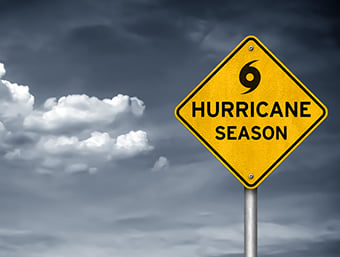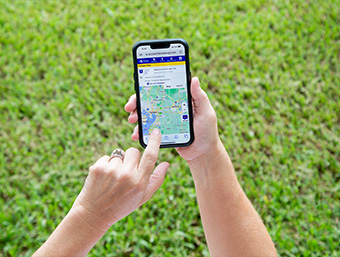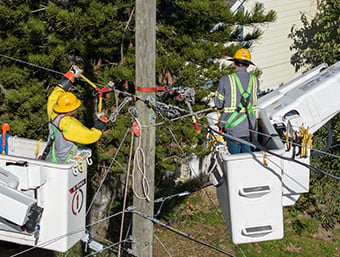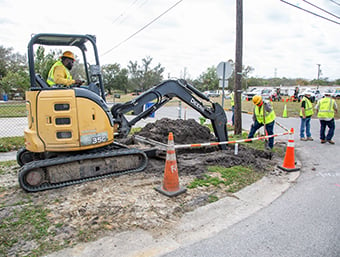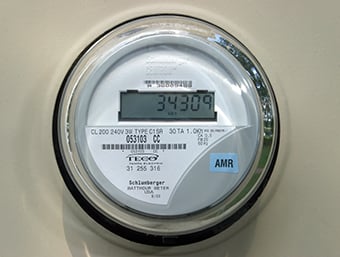Together, we can power through any storm.
Whether you're new to the area or a lifelong resident, you know Florida's weather can be severe. Tampa Electric's continuous improvement, planning, preparation and resilience have supported the region through more than 125 hurricane seasons, and we're committed to helping you stay safe and informed before, during and after severe weather. Here in our Storm Center, we offer critical information and tips related to your electricity that will help you reduce risk, avoid hazards and recover quickly when storms strike. Download our hurricane brochure, an additional resource to help you prepare.
Follow these tips to stay safe and protected.
Avoid Downed Power Lines
Electrical hazards can happen anywhere, at any time. To stay safe around power lines and avoid other electrical hazards, follow these tips, download our Power Line Safety flyer and visit the Electrical Safety Foundation’s Power Line Safety site.
To report a downed or damaged power line, call 911, then call Tampa Electric at 877-588-1010.
Avoid Power Lines
STAY AS FAR AWAY FROM POWER LINES AS POSSIBLE! Always assume downed power lines are energized. They do not have to pop or snap to be energized.
DO NOT TOUCH power lines or anyone or anything that touches power lines – such as a tree branch, fence, vehicle or even water.
Drive Carefully
DO NOT drive over downed power lines. If a power line contacts any part of your vehicle, stay inside and tell others to stay away until the line is safely removed and the power is turned off.
If you must leave the car due to a life-threatening situation, DO NOT touch the car while getting out. Jump clear of the car and land on both feet. When your feet hit the ground, shuffle or hop away from the vehicle to a safe area. No part of your body should be touching the car when your feet hit the ground.
Look Before You Trim
DO NOT trim trees or vegetation touching or near power lines. Never pull tree limbs off power lines or go into areas with dense debris or downed trees as power lines could be hiding underneath. Only qualified tree contractors should trim trees around power lines. Use our online tree trimming form to report tree limbs that may interfere with electric service.
No Drones
DO NOT fly drones or other objects near power lines. If an object gets entangled with the power lines, DO NOT try to retrieve it.
Energized Solar
Treat solar panels like power lines. Avoid downed or damaged panels, wiring and components. Assume they are energized like a power line. Stay as far away as possible and call 911 for assistance.
Mark Buried Power Lines
Avoid underground power lines. Whether you’re planning a do-it-yourself project or hiring a professional, call 811 or visit Sunshine811.com at least two full business days before digging. For your protection, underground power lines will be marked for free.
Operate Generators Safely
Portable generators can be a lifesaver during a power outage, but they can pose a threat of fire, carbon monoxide poisoning and electrocution if not used properly. Always follow the manufacturer’s instructions, our tips and visit FEMA’s Generator Safety website to ensure safe and proper operation.
Connecting Portable Generators
DO NOT connect portable generators to home circuits, a breaker panel, fuse box or meter box. Doing so can create a hazard for utility line workers. Plug appliances directly into the generator using heavy-duty, outdoor-rated cords with a wire gauge adequate for the appliance load. If unsure, consult a licensed electrician.
Beware of Fire
To avoid a fire, obey all local, state and national electrical and fire codes. Store gasoline in approved containers out of children’s reach, and never fuel a generator when it's running. Always have a fully charged, properly rated fire extinguisher (electrical/gas fires) ready.
Operating Permanent Generators
Protect lineworkers. Use fixed or permanent standby generators installed by a licensed electrician, including a double-throw transfer switch during a power interruption. A properly installed transfer switch isolates the generator from the main electric grid to prevent backfeeding.
Watch for Lineworkers
Watch for utility crews and turn your generator off when crews are in your area. The electrical load on the power lines can be hazardous for crews making repairs.
Get Professional Help
Call an electrician to repair a generator. Never attempt to repair it yourself.
Always have a licensed electrician install stationary or standby emergency generators.
Safe Generator Placement
DO NOT operate portable generators indoors, in closed garages, near AC ducts, or in other enclosed areas.
Locate generators away from doors, windows and other building openings. Operating a portable generator in a residence or enclosed space can create deadly carbon monoxide gas.
DO NOT run an uncovered portable generator in the rain, operate in a dry outdoor location.
Turn Around, Don't Drown.
Flooding and storm surge can create life-threatening conditions and destroy property. To protect your loved ones and belongings, be prepared by following our tips and visiting the National Weather Service’s Flood Safety page for additional resources.
Avoid Flood Waters
Stay out of floodwater and storm surge. They can hide energized power lines and other hazards. Wait until the waters have receded to go outside.
If rising water threatens your home – or if you evacuate your home – turn off your power at the main switch (circuit breaker panel or fuse box) in case water enters your home.
Hire a Professional
Hire a licensed electrician to inspect your electrical system if your home or business is flooded. If there is damage, an electrician will need to make necessary repairs and obtain certification from your local building authority before Tampa Electric can reconnect power.
Get an Inspection
Submerged vehicles should be professionally inspected; it may be a safety hazard. Do not store the vehicle indoors or near other cars. Have an authorized service technician inspect it for any damage that could pose a fire risk.
Turn Off Power
Turn your electricity off while your home is still dry if you're leaving for an extended period, or if flooding is imminent. Flip each circuit breaker off one at a time and then turn off the main circuit breaker to avoid a fire hazard.
If your breaker box is located outside or in a room that is holding water, do NOT turn off the power yourself. Contact your utility company and ask them to shut off the power at the meter.
When you return home after flooding, do NOT turn the power back on yourself. Have a licensed electrician check your home and re-energize your circuits.
Reduce Risk
Do not touch any electrical devices or appliances while standing in water.
Do not touch anything electrical that has been in contact with water.
Do not enter any area where the water has risen above the electrical outlets.
Beware of areas where any wiring may be underwater.
Do NOT plug wet appliances in until they can be checked by a technician and found to be safe.
Wait 5 to 10 minutes before turning appliances and electronics back on after power is restored, to help avoid damage.
Keep Dry
DO NOT touch wet electrical equipment such as transformers, circuit breaks, fuses, power lines, wiring, etc., or use or touch wet electrical appliances with wet hands, in or near water, or while standing on a wet or damp surface.
Lightning is one of nature’s most powerful forces, but it's often misunderstood. Explore the facts behind common myths and learn what can happen when lightning strikes.
Hide From Lightning
Did you know Florida is the lightning strike capital of the country? On average, we have about 110 lightning events every 85 miles. Remember, if you hear thunder, then lightning is within ten miles. The shorter the time elapsed between when you see lightning and hear thunder, the closer the lightning is to you. Protect yourself and your loved ones from dangerous lightning by following these safety tips or visiting the National Weather Service's lightning safety page.
Unplug Electrical Devices
Turn off, unplug, and stay away from appliances, headsets, landline telephones, computers, power tools, and TVs. Lightning can strike exterior electric and phone lines and send shocks to inside equipment.
Avoid Water
Get out of the water as quickly as possible if you see lightning. Do not boat or fish, engage in water-related activities, wash your hands, shower, do laundry or touch water when lightning is present. It can result in electrocution.
Seek Shelter
Avoid power poles and seek shelter away from open spaces if you see lightning. Go to a low-lying area, house, large building, or an automobile with a metal roof. Stay away from trees, tall objects and doors. Keep windows closed and stay off porches. If you can’t find shelter, crouch down and put your feet together, with your hands over your ears. Wait at least 30 minutes after you hear the last clap of thunder to leave your shelter.
Stay Away From Metal
Don't touch metal objects when lightning is in the area, such as automobiles, electric wires, fences, machinery, motors, golf equipment and carts, bicycles and power tools.
Smell Gas? Act Fast!
Even though your natural gas delivery most likely won't be interrupted during a storm, be aware of potential leaks. If you smell rotten eggs or a sulfur-like odor, there may be a leak or damage to a natural gas line. Immediately move to safety and call 911, then call Peoples Gas at 877-832-6747. For more information on natural gas safety, visit Peoples Gas.
Additional tips:
- You can turn natural gas appliances' supply values off, but only qualified personnel should operate the main valve.
- If your natural gas appliances have been flooded or damaged, or if you have pilot light issues, have the equipment inspected and serviced by a qualified plumber or appliance technician before operating.
- Most natural gas appliances have safety valves that automatically shut off the flow of natural gas when the pilot light goes out.
- Consult the appliance operating manual before lighting burners manually.
Secure Your Electric Vehicle (EV)
Electric vehicles (EVs) have unique safety hazards in severe weather. If you have an EV, please follow the directions in your owner's manual, note the safety tips below or visit the National Highway Traffic Safety Administration for more details.
Before the storm
- Fully charge your electric vehicle (EV) before severe weather to prepare for potential power outages. Adjust your vehicle’s daily charging limit to 100% to allow for the maximum driving range if it’s currently set to 80%, as most manufacturers recommend.
- Park your EV in a secure location away from areas that may flood.
During the storm
- Prevent electrical hazards. Avoid charging your EV during severe weather. Ensure your charging equipment is disconnected and safely stored when not in use.
- Adhere to manufacturer safety recommendations if you export power from your EV to run home appliances during a power outage. Remember, doing this will decrease your EV’s driving range.
After the storm
- Inspect your EV for damage or water intrusion before using it.
- Submerged EVs could be a safety hazard. Do not try to start it. Have it inspected by an authorized service technician for any damage that could pose a fire risk.
- Follow all manufacturer safety recommendations if you export power from your EV to run home appliances during a power outage. Remember, doing this will decrease your EV’s driving range.
- Monitor your EV manufacturer’s online resources and mobile apps for important information and tips.
Be Storm Ready
We urge you to follow these important safety tips, prepare early, monitor emergency officials and use extreme caution before, during and after severe weather.
- Register for an online account. Store your account number and log-in information in a safe place, and set up notification preferences for essential storm updates.
- Subscribe to Power Up. Our electronic newsletter keeps you informed about important storm preparation and restoration information.
- Prepare for power restoration. After a power outage, wait 5 to 10 minutes before individually turning on appliances and electronics. This reduces stress on the power system and allows all customers to be restored quickly.
- Sign up with Florida’s Special Needs Registry to provide emergency management agencies and first responders with valuable information about your special needs during disasters and other emergencies. All your information is kept confidential.
- Avoid scams. Scammers know we’re distracted by a storm. They create websites that look like ours and use other tactics like spoofing our phone number and posing as one of our team members to trick you. Don't be fooled. Visit our scam awareness page to learn more and report scams.
- Stay far from tornados. Find a sturdy shelter. Move to an interior room on the lowest floor and avoid windows and doors.
- Secure your pets: Ensure that pets are safely secured and keep them away from power equipment and work areas.
- Clear debris carefully. If you clean up storm debris, stack it away from travel areas and power poles to avoid interfering with restoration efforts. Never pull tree limbs off power lines as they could be energized. Never go into areas with dense debris or downed trees as power lines could be hiding underneath.
- View assistance programs for your home or business.
Get Help
Visit these helpful sites for additional information on severe weather and emergency information.
Register for Tampa Electric's Medical Watch Program.
If you are dependent on in-home electric-powered medical equipment, enroll in our Medical Watch program. Participation in Medical Watch does not guarantee uninterrupted service, provide priority restoration or extended payment options.
Contact Local Emergency Management Resources:
If you or a loved one have special needs and/or require help locating a shelter or transportation, contact your local emergency management department below to arrange assistance.
Review Government and Non-Profit Resources:
- Ready.gov - Hurricane Information
- Red Cross Hurricane Preparedness - Hurricane Preparedness
- Federal Emergency Management Agency (FEMA) - Assistance After a Disaster
- Florida's Safety Page - tips to keep you safe.
- Florida Disaster - Preparing for the Hurricane Season
Safety
A. Tampa Electric will never call and ask you to make a payment through a payment app. This is an example of a “spoofing” scam. “Spoofing” is when scammer calls a customer from a phone number that falsely appears to be TECO. Scammers often target customers when they are vulnerable, after a hurricane. Tampa Electric will never call to ask for credit or debit card numbers or ask you to purchase a prepaid credit or debit card. If you suspect a call is a scam, HANG UP. To stop a scam, it’s always a good idea to know your account status. Reference your most recent bill or log into your account to check. For more safety tips and to report a scam, visit TampaElectric.com/Scam.
A. If you encounter a downed power line, always assume it is energized, move a safe distance away (at least 30 feet) and immediately call 911, then Tampa Electric at 877-588-1010. Never drive over downed power lines or touch power lines, including anyone or anything touching the line. This includes a fence or other object the line may fall onto. The results can be deadly. Warn others to stay away. For more safety tips, visit our power line safety page.
A. No, it is extremely dangerous to drive over power lines. Driving over a downed line can cause poles or other equipment to come crashing down. If you are in a car that comes in contact with a downed power line, stay in your vehicle and wait until the utility arrives to safely de-energize the line.
A. The odor of rotten eggs is an indicator that a natural gas line might be damaged. If you smell gas, immediately move to safety, and call 911, then call Peoples Gas at 877-832-6747. Get more information on natural gas safety.
A. Always avoid driving or walking through flood waters – they may be energized with electrical current and create hazardous conditions.
A. No. If you are forced to evacuate your home due to flooding, you should turn off your power at the circuit breaker panel or fuse box. Always ensure your hands are dry before touching a circuit breaker and you are not standing on a wet or damp surface. During and after flooding, your home and the surrounding area may be highly dangerous due to mud deposits and debris that can still conduct electricity.
A. Some customers may be affected by flooding or other storm damage to their home’s electrical equipment and, therefore, may not be able to receive electricity safely. In those cases, we recommend that the customer work with a licensed electrician to inspect their system and make necessary repairs before power is restored and/or before turning on their circuit breaker. This is important to support your safety as well as your home and electronics. The electrician can inspect and make repairs as needed, and can coordinate with local building authorities for any required permitting. Power can be restored when private electrical or property damage is resolved and can be energized safely. Visit TampaElectric.com/DamagedEquipment to learn which equipment relies on Tampa Electric for repairs and when to call a licensed electrician.
A. If your home or business is flooded, we cannot reconnect power until the electrical system has been inspected by a licensed electrician. Once appropriate repairs have been made by the licensed electrician, he or she will need to obtain verification from your local building inspection authority before power can be restored.
Your Power
A. If you do not have power, please contact us or check out our outage map.
There are three ways to report an outage: Text OUT to 27079, call us at 877-588-1010, or report it online.
A. Even if your neighborhood is served by underground lines because the electrical lines that feed your neighborhood, including main distribution lines and transmission lines, are above the ground you may still experience a power outage during a storm.
A. After a storm, when winds are consistently under 40 mph, our crews must physically inspect and determine how much replacement equipment is needed and how many labor hours are required to make repairs. Because this is a manual process, it’s extremely difficult to provide detailed estimated restoration times (ETRs) and other information. Be assured you will not be forgotten.
A. Troubleshooters and lineworkers are skilled technicians. Each utility has the appropriate number of these people to handle the normal operations and repairs of the company's service area. When a major weather event impacts an area, the utilities across the country share people in order to restore power to as many customers as quickly and safely as possible.
A. Even underground systems can be impacted by damage to overhead distribution lines that feed them. Our Storm Protection Plan invests millions of dollars annually towards increasing reliability and, in turn, lowering restoration time and costs during future storms. Many of our efforts, like our goal of converting 75-100 miles of targeted overhead lines to underground annually, are focused on protecting lines from contact with things like fallen trees that can cause lengthy outages. In addition to undergrounding targeted overhead lines, we’re strengthening power lines by replacing wood with steel and concrete, making key equipment like substations more resilient, and increasing our tree trimming schedule to protect lines. Since the program began in 2020, we have trimmed nearly 15,000 miles of vegetation near our overhead lines, converted more than 150 miles of overhead neighborhood lines to underground, hardened nearly 3,500 feeder poles and replaced more than 2,000 wooden transmission poles with stronger alternatives like steel and concrete. This work will not eliminate outages but reduce them and help us restore outages faster. Learn more here.
Outage Map And Notifications
A. This situation indicates that your circuit/feeder, which serves thousands of people in your area - including your home or business - was restored, which closed the outage in our system because of the way it was grouped with other outages in your area. However, your individual location might still be without power due to storm damage on another part your service line, which serves much fewer people or in some cases, the part of your service line coming directly to your home or business.
You also could have an issue on your side of the meter, which would only affect you and may need a licensed electrician to inspect and repair. If you are experiencing a new outage or your existing outage is not accurately reflected on our Outage Map or in a notification you received from us, please report your outage. This will create a new outage incident in our system, which is helpful to our continued restoration work. Customers who are enrolled in outage alerts receive restoration notifications – the notifications include an option to report that your power is still out. You can also report it by calling us or by texting OUT to 27079.
A. We know that not having an estimated restoration for your specific address is frustrating, especially while many other people’s power has been restored and you’re still waiting. Providing an estimated restoration for essentially all customers versus individual restoration times is a very common approach for electric utilities during hurricane response. While our outage map’s individualized estimated restoration time is a great function under normal circumstances and for small storms, it is not intended to provide individualized estimates when the utility addresses a large volume of outages and complex damage inflicted by hurricanes. We strive to provide the most realistic expectations for our customers – to do that with a severe storm, we provide an estimated restoration time that applies to essentially all customers. We work hard to get everyone’s power back on as soon as possible.
A. Customers may experience delayed, repeated and/or temporary outages even though the storm has passed. This causes the number of outages on our outage map to fluctuate up and down. This is normal and expected after a storm. It can happen for several reasons, including:
- Sometimes during the restoration process, we may need to temporarily de-energize sections of circuits for our crews’ safety while they perform the restoration work. This will cause a temporary outage. In most cases, our crews will have the power on again quickly. The outage map can show fluctuations based on this activity.
- New outages can occur - even at addresses we previously restored - if there is delayed damage to our grid or facilities. For example, a tree falling on an overhead line can result in new outages.
- Please know that our goal is to get every customer’s power restored as quickly and safely as possible, and we’re working hard to accomplish that.
A. As we deploy repair crews, our outage map may say, “on our way to investigate” or customers may receive a notification (if signed up for restoration updates) that says “Crews en route.” However, due to the extensive list of outages and the complexity of repairs after a storm, we cannot give a time frame of how long it will be before the crews can get to each repair they are assigned to investigate. Please refer to our estimated restoration time for your area. Remember that depending on the nature and location of the damage creating your outage, you may not see our crews as they complete the repair.
Power Restoration
A. We restore electric service to health and safety facilities, including hospitals, fire and police stations, and major water, wastewater, and communication facilities. Then we restore places necessary to provide essential supplies, like grocery and hardware stores. The next priority is restoring the greatest number of residential customers in the shortest amount of time.
To do this, utilities prioritize repairs based on the number of customers affected and the complexity of the repairs. Transmission line repairs come first, followed by feeder and primary lines and finally secondary and service lines. This approach allows us to quickly bring the most people back online. To learn more about our process, visit Power Restoration.
A. After a storm, we actively work in all neighborhoods across our service area. We prioritize repairs that will restore the largest number of customers’ electricity as quickly as possible. As the restoration process continues, the number of trucks in neighborhoods continues to grow. It’s important to keep in mind that our grid is interconnected. That means the source of a neighborhood’s outage may not be in the affected neighborhood, but somewhere else in the system. In addition, multiple repairs may be needed to restore power for some outages.
A. It’s common for neighbors to have power restored at different times because the cause of their outages is different. We have about 800 circuits that deliver electricity to homes and businesses. Each circuit serves up to a thousand (or more!) customers and requires varying resources to repair depending on the damage. Which circuits get restored first? Easier repairs benefitting the most customers will be addressed sooner than repairs that resolve fewer outages and take a lot more time and people. This strategy allows us to help the community return to normal as fast as possible. Every single customer matters equally to us. We work 24/7 to get every customer's lights back on! If you are on the same service line as your neighbor, you could have damage to your electric meter that is interrupting electric service to your home or even damage to your home’s electrical system.
Billing
A. You will not be charged if you did not have power.
A. We do not offer a credit or reimbursement for food loss due to a storm-related outage. FEMA is accepting applications for assistance at DisasterAssistance.gov.
A. Customers are only charged for the power they consume. If you do not have power, your meter is not running. If you are on budget billing, usage changes will be factored into your payment calculation at your next periodic or annual review.
Watch our videos for answers to your top questions.
Safety Tips
Stay away from power lines
Learn what to look for and how to protect your loved ones from harm.
Use generators safely
Stay safe with this quick guide to proper generator use.
Beware of water and power
View key safety tips before restoring power after a flood.
Storm Preparation Tips
Protect electrical systems
Learn how to prepare for flooding and reduce electrical risks with these safety tips.
Prepare for power outages
Prep safely for storms with quick tips to prevent damage and electrical hazards.
Learn how we prepare
Watch our webinar to see how we help businesses stay informed and prepared.
Power Restoration Information
Understanding power delays
Learn how storm damage and safety affect when your power is restored.
Prioritizing restoration
After a storm, power is restored in stages, starting with critical infrastructure.
Working behind the scenes
Learn how complex repairs and the interconnected grid affect power restoration.
Restoring underground lines
Discover how storm damage to overhead lines and our grid affects underground lines.
Recurring power outages
Learn why outages can recur and how crews work nonstop to restore power safely.
Repairing electric equipment
Identify essential safety tips and who’s responsible for electrical repairs.
Outage Map Questions
Interpreting our messages
Learn what our outage map messages mean during blue skies and gray.
Setting restoration times
After storms, we provide power restoration estimates by area for better accuracy.
Updating delays
Learn why outage maps may not update immediately during ongoing storm repairs.
Read related stories.
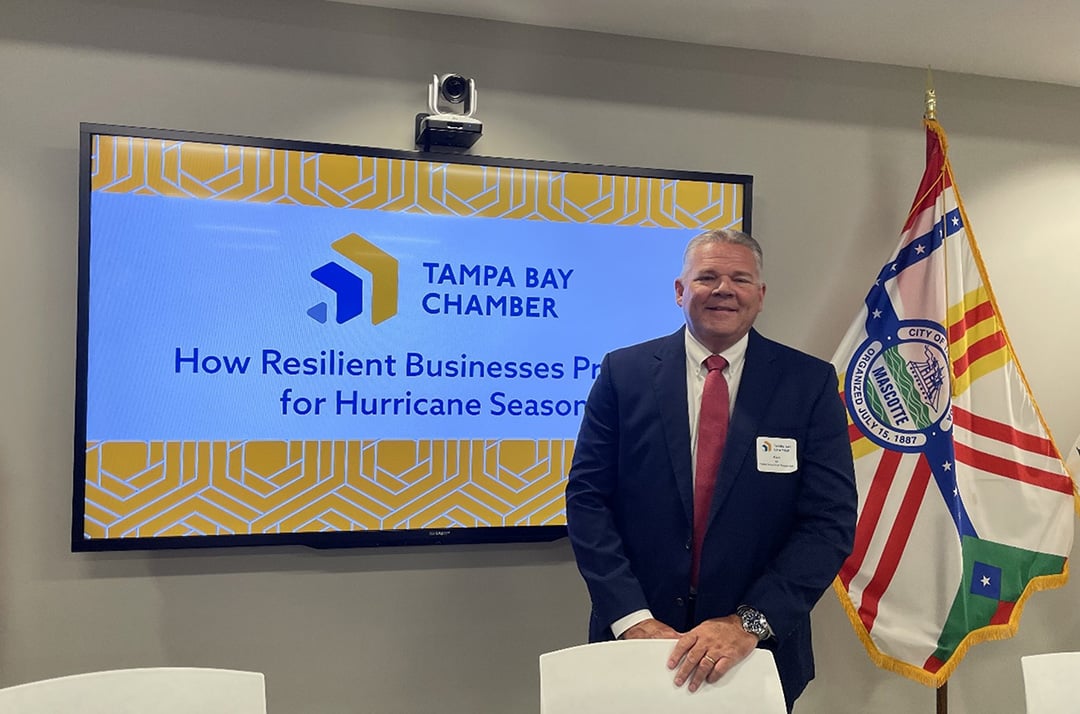
What’s the most essential tool for your business in a crisis?
Few things strike fear in the heart of business owners like hurricane season....
READ MORE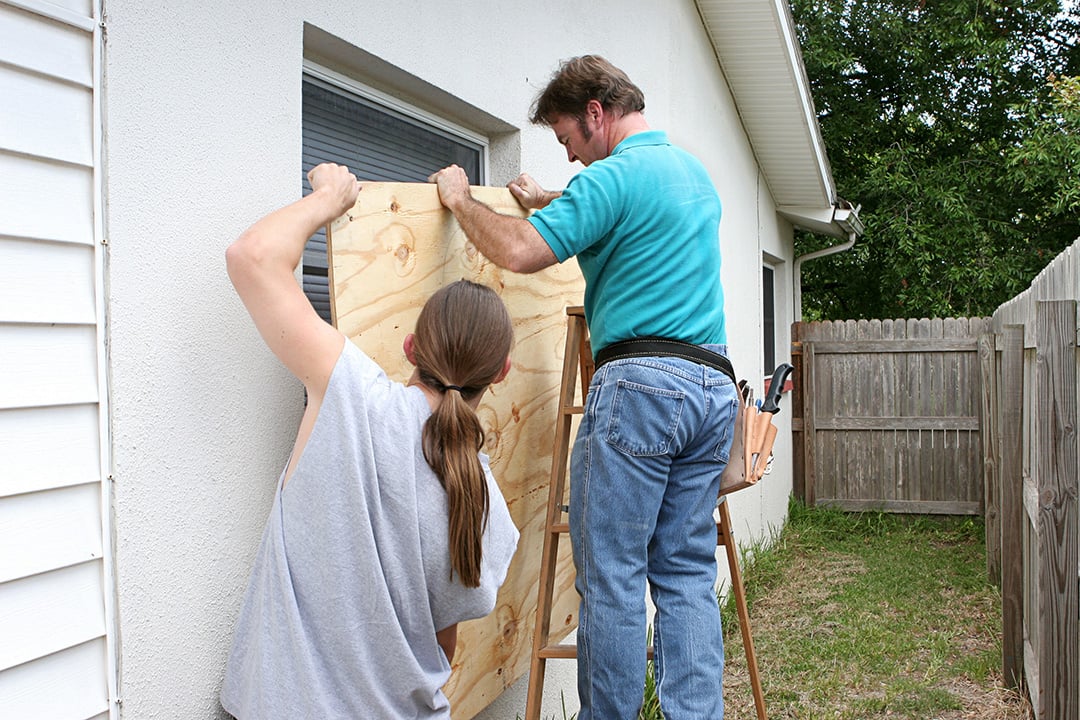
What kind of storm prepper are you?
Luckily, Tampa Electric is a Type A Prepper! We work year-round to deliver 99.98% service reliability, minimize outages and improve power restoration times in blue skies and gray....
READ MORE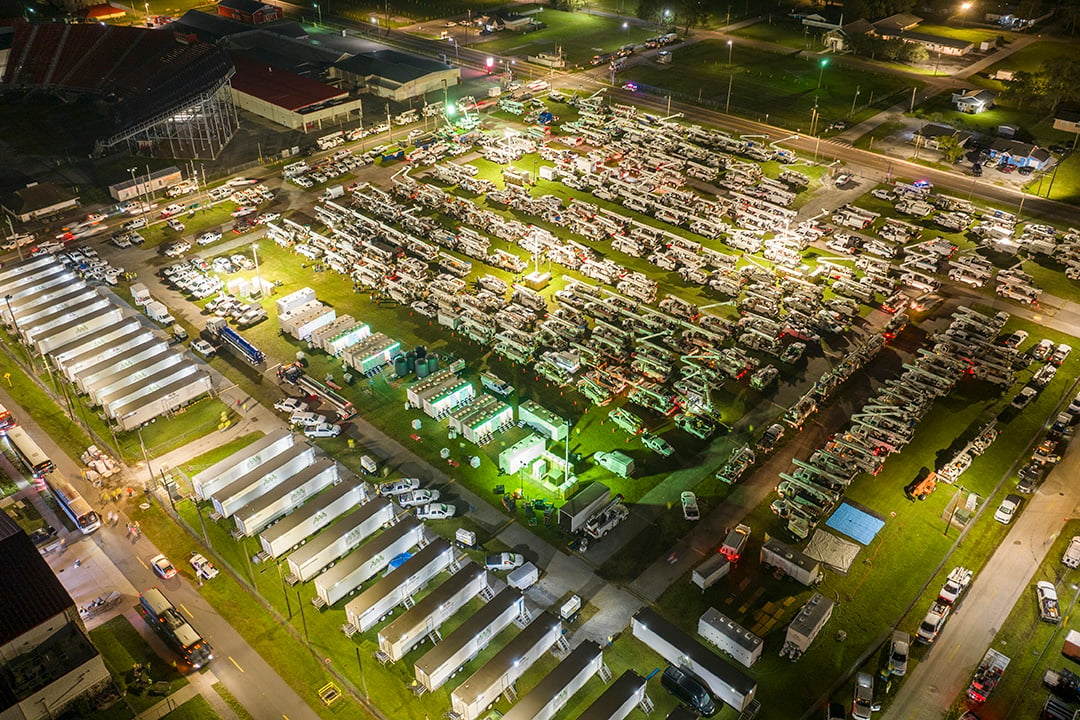
Powering Through the Aftermath: Tampa Electric’s Response to Hurricane Milton’s Destruction
It takes an army to respond to a storm like Hurricane Milton. When we heard the catastrophic weather predictions, we sprang to action....
READ MORE
